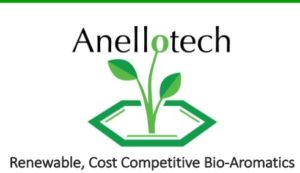 Anellotech announced today that it has developed proprietary technology to extend catalyst lifetime in its Bio-TCat™ process for low cost conversion of biomass into valuable aromatic chemicals and renewable fuels. The new MinFree™ technology reduces mineral (ash) content of biomass feedstocks, thereby enabling economic catalyst lifetimes.
Anellotech announced today that it has developed proprietary technology to extend catalyst lifetime in its Bio-TCat™ process for low cost conversion of biomass into valuable aromatic chemicals and renewable fuels. The new MinFree™ technology reduces mineral (ash) content of biomass feedstocks, thereby enabling economic catalyst lifetimes.
“This is a breakthrough innovation for the industry and vital to technological success” said Chuck Sorensen, Anellotech CTO. “It opens up the possibility to use many types of low-cost biomass feedstocks that contain high levels of well-known catalyst poisons. MinFree technology represents a major step forward, enabling the cost competitiveness of Anellotech’s biomass conversion process.”
“MinFree is an important development needed to advance our Bio-TCat process toward commercialization as it contributes to our ability to achieve attractive returns even in a low oil price environment, whether licensees opt for using Bio-TCat products as renewable fuels or chemicals,” stated David Sudolsky, Anellotech President and CEO. “The recent demonstration of MinFree at ton scale was a significant accomplishment.”
Anellotech has partnered with leading technology providers IFPEN/Axens for process development and Johnson Matthey for catalyst technology. “We’re fortunate to have our R&D team working side-by-side with industry-recognized experts who have long-term commitments to this program,” said Sudolsky. “Together with partners Suntory and Toyota Tsusho, our Alliance is dedicated to developing an efficient, economic, and commercially viable end-to-end process, of which biomass handling and pre-treatment are critical components.”
About Anellotech
Anellotech is developing the Bio-TCat process to produce cost-competitive renewable aromatic chemicals (benzene, toluene and xylenes, “BTX”) from non-food biomass for use in making plastics such as polyester, nylon, polycarbonate, polystyrene, or for renewable transportation fuels. Bio-TCat co-products, C9+ aromatics and carbon monoxide, can be used to make cellulosic jet and ethanol bio-fuels respectively, via 3rd party technology. The key differentiators driving Bio-TCat’s cost-competitive advantage are its MinFree™ biomass pretreatment followed by a one-reactor catalytic process. The Bio-TCat reactor outlet hydrocarbon product requires only mild hydrotreating to remove trace impurities using existing oil refining technology. Contrast this with multi-step pyrolysis processes that make a highly-oxygenated bio-oil intermediate product which requires costly high pressure hydrogenation and additional refinery upgrading. By using renewable and readily available non-food materials, such as sustainably harvested wood, corn stover and bagasse, the Bio-TCat process is less expensive compared to processes relying on sugar as a feedstock, and avoids competition with the food chain. As a result, these renewable chemicals are expected to be produced and sold profitably either against identical, petroleum-derived BTX counterparts, or as renewable fuel blend stocks. Anellotech complements its world-class R&D team with in-depth, highly-interactive, and long-term alliances with leaders in process development, catalysis, engineering design, and licensing to accelerate development and drive cost-competitiveness. IFPEN is our process development and scale-up partner, Johnson Matthey is our catalyst development partner, and Axens is our partner for industrialization, commercialization, global licensing and technical support. Industry-leading strategic partners in the BTX supply chain, including Suntory and Toyota Tsusho also have provided capital to Anellotech. For additional information, please visit: www.anellotech.com
Source: Anellotech